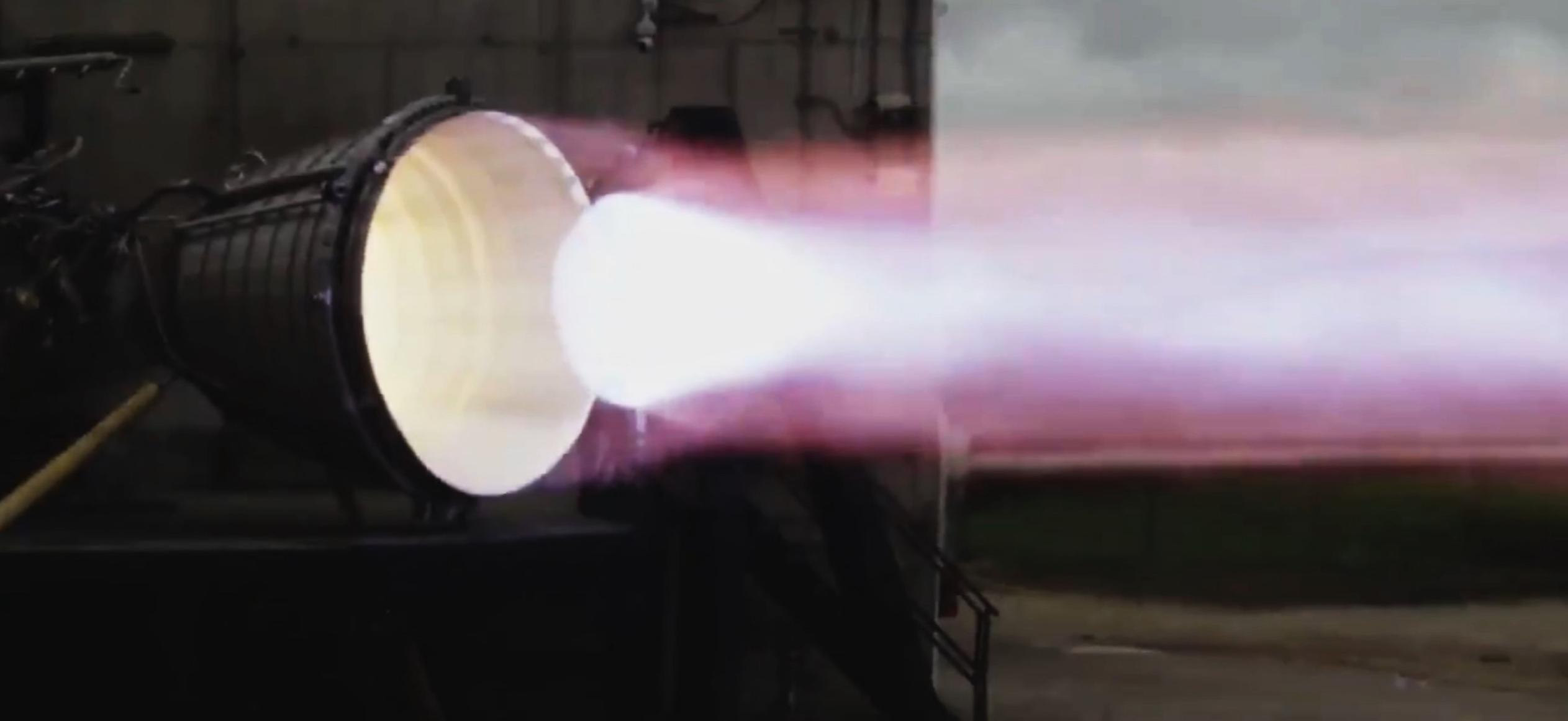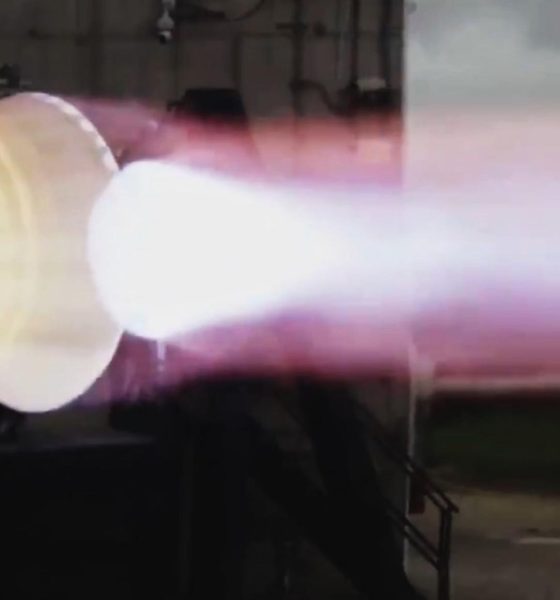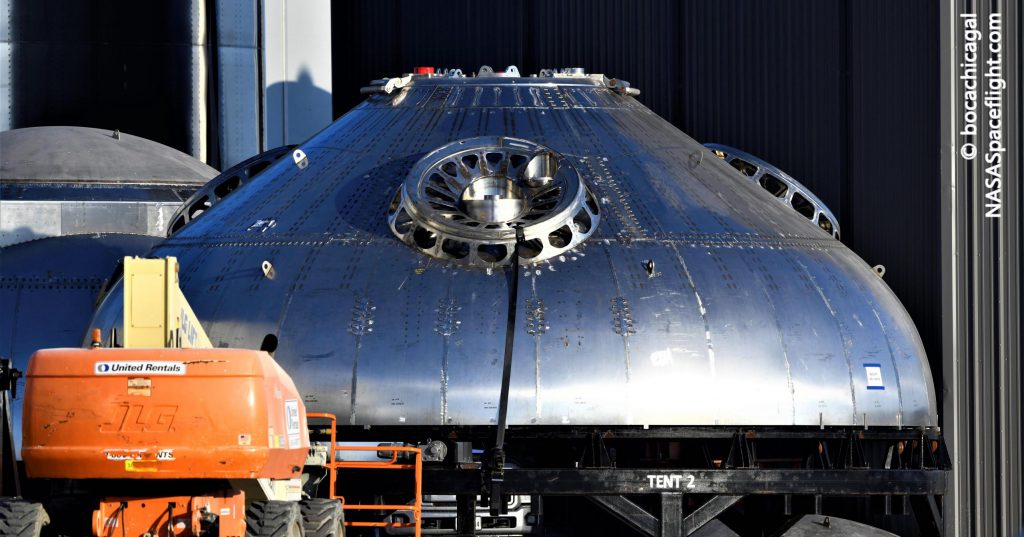

News
SpaceX sends Starship’s first vacuum Raptor engine to Boca Chica
For the first time, SpaceX has shipped a vacuum-optimized Raptor engine to its Boca Chica, Texas Starship factory days after the company’s present reiterated plans for an inaugural orbital launch attempt as early as July.
Back in March 2021, CEO Elon Musk confirmed that he’d set SpaceX a goal of attempting Starship’s first orbital launch no later than the end of July – around four and a half months distant at the time. Fifteen weeks later, though the prospects of an orbital launch attempt happening in July have practically shrunk to zero, SpaceX COO and President Gwynne Shotwell – best known for acting as a more grounded foil to Musk’s often impractical schedule estimates – reiterated that the company is still “shooting for July” for Starship’s first orbital launch attempt.
As of late June, hitting that target would require SpaceX to string together numerous extraordinary feats of engineering and rocketry in record time or attempt some extremely unorthodox corner-cutting.
The launch pad and launch vehicle hardware needed for Starship’s first space shot are currently far from ready for flight. On June 24th, Musk unexpectedly revealed that the Super Heavy booster prototype SpaceX is now in the late stages of assembly isn’t actually the booster that will carry Starship on its first space launch attempt. In other words, though dozens of rings in various states of work are strewn about SpaceX’s Boca Chica factory, the company has yet to begin assembling the massive 65m (~215 ft) tall booster required for the first orbital launch attempt.
Using Super Heavy Booster 3 (B3) as a ruler, assembly could easily take 9-10 weeks – starting whenever the process actually begins. If SpaceX started stacking Booster 4 today, in other words, it’s unlikely that the rocket would even be complete by the end of August. Barring SpaceX taking unprecedented shortcuts, completing the booster is just part of the process of preparing for flight and B4 would still need to be qualified for flight, likely involving at least one cryogenic proof and static fire test.
In a best-case scenario where SpaceX begins assembly today, manages to halve Booster 4 assembly time in one fell swoop, the sneaks the second Super Heavy ever completed through qualification testing in a single week, the orbital flight test booster still wouldn’t be ready for Starship installation (likely another unprecedented first) before mid-August.
That would then leave SpaceX five or six weeks to fully assemble Starship S20, a process that has yet to begin. Like Starship SN15, which Musk said sported “hundreds of improvements”, Musk has also stated that Ship 20 and all after it will feature another batch of upgrades needed to take Starship orbital. Starship SN15 was very gradually stacked and assembled over the course of almost four months, though that slow assembly can likely be blamed on the fact that SpaceX is busy testing Starships SN8 through SN11 and was effectively waiting to see if any other major changes might be required.

While most of S20’s upgrades are a mystery, the ship’s thrust dome – spotted in work at Boca Chica earlier this month – has already confirmed that the prototype will be the first with the necessary hardware for Raptor Vacuum engine installation. That likely means that S20 will also be the first Starship to attempt to static fire six Raptor engines*, potentially producing more thrust than a Falcon 9 booster. On June 27th, one such vacuum-optimized Raptor (RVac) arrived in Boca Chica for the first time ever, making it clear that the comparatively brand new engine may already be ready to start integrated Starship testing.
*Update: SpaceX CEO Elon Musk says that the Raptor Vacuum delivered to Boca Chica on June 27th is, in fact, meant for Starship S20, seemingly confirming that the prototype will fly with a full six Raptor engines.
Of course, beyond Starship and Super Heavy, SpaceX also has a great deal of work left to get the rocket’s first orbital-class launch facilities partially operational. SpaceX will need to complete and activate at least one or two more custom-built propellant storage tanks, sleeve those three or four tanks with three or four massive thermos-like ‘shells,’ complete thousands of feet of insulated plumbing and wiring, finish a massive ‘launch table,’ install that table on a six-legged ‘launch mount;’ outfit that table and mount with an array of power, avionics, hydraulics, and fueling equipment and plumbing; complete a ~145m (~475 ft) ‘integration tower,’ and perform the first fit checks and shakedown tests with a real booster or Starship.
Only then will SpaceX be able to attempt Starship’s first space launch. All told, it might not be literally impossible for SpaceX to complete all the above work in less than five weeks, but it’s safe to say that the odds of that happening could probably make a lottery ticket blush. Regardless, if Starship reaches orbit at any point before the end of 2021, it would beat out simpler “next-generation” rockets like Ariane 6, ULA’s Vulcan, and Blue Origin’s New Glenn despite beginning concerted development years later and with a far less certain funding situation.

News
Tesla ships out update that brings massive change to two big features
“This change only updates the name of certain features and text in your vehicle,” the company wrote in Release Notes for the update, “and does not change the way your features behave.”

Tesla has shipped out an update for its vehicles that was caused specifically by a California lawsuit that threatened the company’s ability to sell cars because of how it named its driver assistance suite.
Tesla shipped out Software Update 2026.2.9 starting last week; we received it already, and it only brings a few minor changes, mostly related to how things are referenced.
“This change only updates the name of certain features and text in your vehicle,” the company wrote in Release Notes for the update, “and does not change the way your features behave.”
The following changes came to Tesla vehicles in the update:
- Navigate on Autopilot has now been renamed to Navigate on Autosteer
- FSD Computer has been renamed to AI Computer
Tesla faced a 30-day sales suspension in California after the state’s Department of Motor Vehicles stated the company had to come into compliance regarding the marketing of its automated driving features.
The agency confirmed on February 18 that it had taken a “corrective action” to resolve the issue. That corrective action was renaming certain parts of its ADAS.
Tesla discontinued its standalone Autopilot offering in January and ramped up the marketing of Full Self-Driving Supervised. Tesla had said on X that the issue with naming “was a ‘consumer protection’ order about the use of the term ‘Autopilot’ in a case where not one single customer came forward to say there’s a problem.”
This was a “consumer protection” order about the use of the term “Autopilot” in a case where not one single customer came forward to say there’s a problem.
Sales in California will continue uninterrupted.
— Tesla North America (@tesla_na) December 17, 2025
It is now compliant with the wishes of the California DMV, and we’re all dealing with it now.
This was the first primary dispute over the terminology of Full Self-Driving, but it has undergone some scrutiny at the federal level, as some government officials have claimed the suite has “deceptive” names. Previous Transportation Secretary Pete Buttigieg was one of those federal-level employees who had an issue with the names “Autopilot” and “Full Self-Driving.”
Tesla sued the California DMV over the ruling last week.
News
Tesla workers push back against Giga Berlin unionization
“IG Metall did not succeed in Giga Berlin‘s works council election earlier today. The union share was reduced from nearly 40% in 2024 to 31% in 2026! This is a clear message by the Giga Berlin team towards an independent co-determination! The list called Giga United, led by the current chairwoman, Michaela Schmitz, received the most votes with more than 40%! Good news for Giga Berlin!”

Tesla workers pushed back against unionization efforts at Gigafactory Berlin, and over the past few years, there has been a dramatic decrease in interest to unionize at the German plant.
Gigafactory Berlin Plant Manager André Thierig announced on Wednesday that IG Metall, the European union group, saw its share reduce from 40 to 31 percent in 2026 as employees eligible to vote on the issue. Instead, the Giga Berlin team, known as Giga United, received the most votes with more than 40 percent.
BREAKING! 🚨
IG Metall did not succeed in Giga Berlin‘s works council election earlier today. The union share was reduced from nearly 40% in 2024 to 31% in 2026!
This is a clear message by theGiga Berlin team towards an independent co-determination!
The list called Giga…
— André Thierig (@AndrThie) March 4, 2026
Thierig gave specific details in a post on X:
“IG Metall did not succeed in Giga Berlin‘s works council election earlier today. The union share was reduced from nearly 40% in 2024 to 31% in 2026! This is a clear message by the Giga Berlin team towards an independent co-determination! The list called Giga United, led by the current chairwoman, Michaela Schmitz, received the most votes with more than 40%! Good news for Giga Berlin!”
There were over 10,700 total employees who were eligible to vote, with 87 percent of them turning out to cast what they wanted. There were three key outcomes: Giga United, IG Metall, and other notable groups, with the most popular being the Polish Initiative.
The 37-seat council remains dominated by non-unionized representatives, preserving Giga Berlin as Germany’s only major auto plant without a collective bargaining agreement.
Thierig and Tesla framed the outcome as employee support for an “independent, flexible, and unbureaucratic” future, enabling acceleration on projects like potential expansions or new models. IG Metall expressed disappointment, accusing management of intimidation tactics and an “unfair” campaign.
The first election of this nature happened back in 2022. In 2024, IG Metall emerged as the largest single faction with 39.4 percent, but non-union lists coalesced for a majority.
But this year was different. There was some extra tension at Giga Berlin this year, as just two weeks ago, an IG Metall rep was accused by Tesla of secretly recording a council meeting. The group countersued for defamation.
Tesla Giga Berlin plant manager faces defamation probe after IG Metall union complaint
This result from the 2026 vote reinforced Tesla’s model of direct employee-management alignment over traditional German union structures, amid ongoing debates about working conditions. IG Metall views it as a setback but continues advocacy. Tesla sees it as validation of its approach in a competitive EV market.
This outcome may influence future labor dynamics at Giga Berlin, including any revival of expansion plans or product lines, which Musk has talked about recently.
News
SpaceX President Gwynne Shotwell details xAI power pledge at White House event
The commitment was announced during an event with United States President Donald Trump.

SpaceX President Gwynne Shotwell stated that xAI will develop 1.2 gigawatts of power at its Memphis-area AI supercomputer site as part of the White House’s new “Ratepayer Protection Pledge.”
The commitment was announced during an event with United States President Donald Trump.
During the White House event, Shotwell stated that xAI’s AI data center near Memphis would include a major energy installation designed to support the facility’s power needs.
“As you know, xAI builds huge supercomputers and data centers and we build them fast. Currently, we’re building one on the Tennessee-Mississippi state line. As part of today’s commitment, we will take extensive additional steps to continue to reduce the costs of electricity for our neighbors…
“xAI will therefore commit to develop 1.2 GW of power as our supercomputer’s primary power source. That will be for every additional data center as well. We will expand what is already the largest global Megapack power installation in the world,” Shotwell said.
She added that the system would provide significant backup power capacity.
“The installation will provide enough backup power to power the city of Memphis, and more than sufficient energy to power the town of Southaven, Mississippi where the data center resides. We will build new substations and invest in electrical infrastructure to provide stability to the area’s grid.”
Shotwell also noted that xAI will be supporting the area’s water supply as well.
“We haven’t talked about it yet, but this is actually quite important. We will build state-of-the-art water recycling plants that will protect approximately 4.7 billion gallons of water from the Memphis aquifer each year. And we will employ thousands of American workers from around the city of Memphis on both sides of the TN-MS border,” she noted.
The Ratepayer Protection Pledge was introduced as part of the federal government’s effort to address concerns about rising electricity costs tied to large AI data centers, as noted in an Insider report. Under the agreement, companies developing major AI infrastructure projects committed to covering their own power generation needs and avoiding additional costs for local ratepayers.








